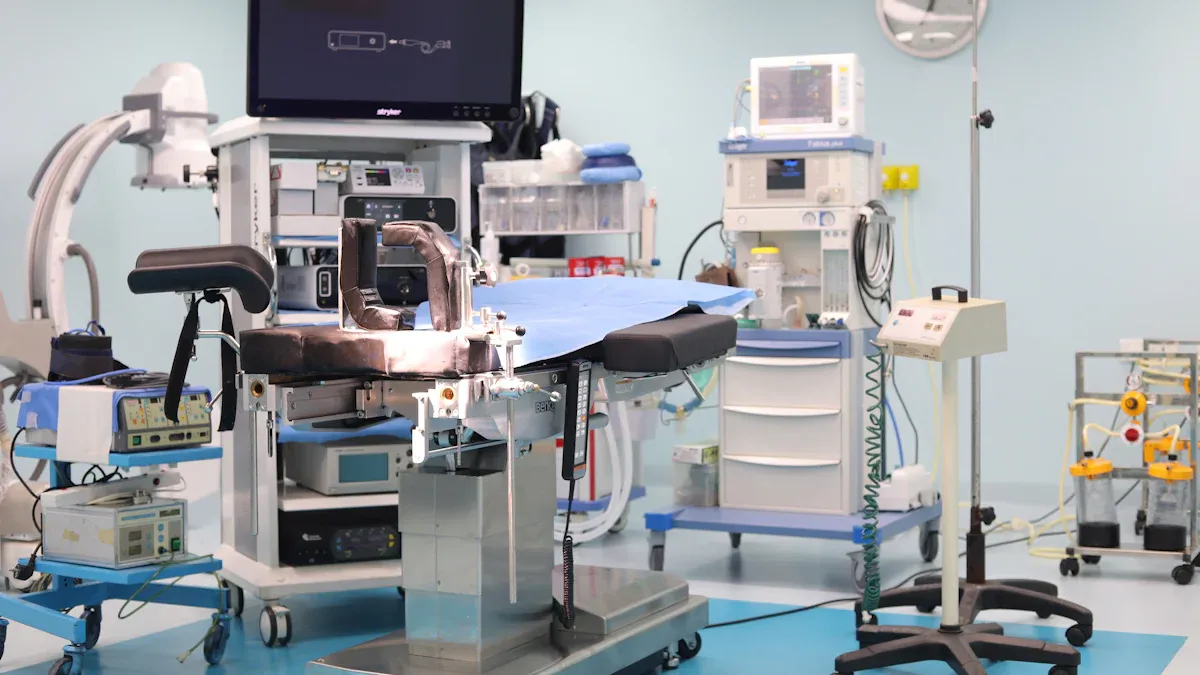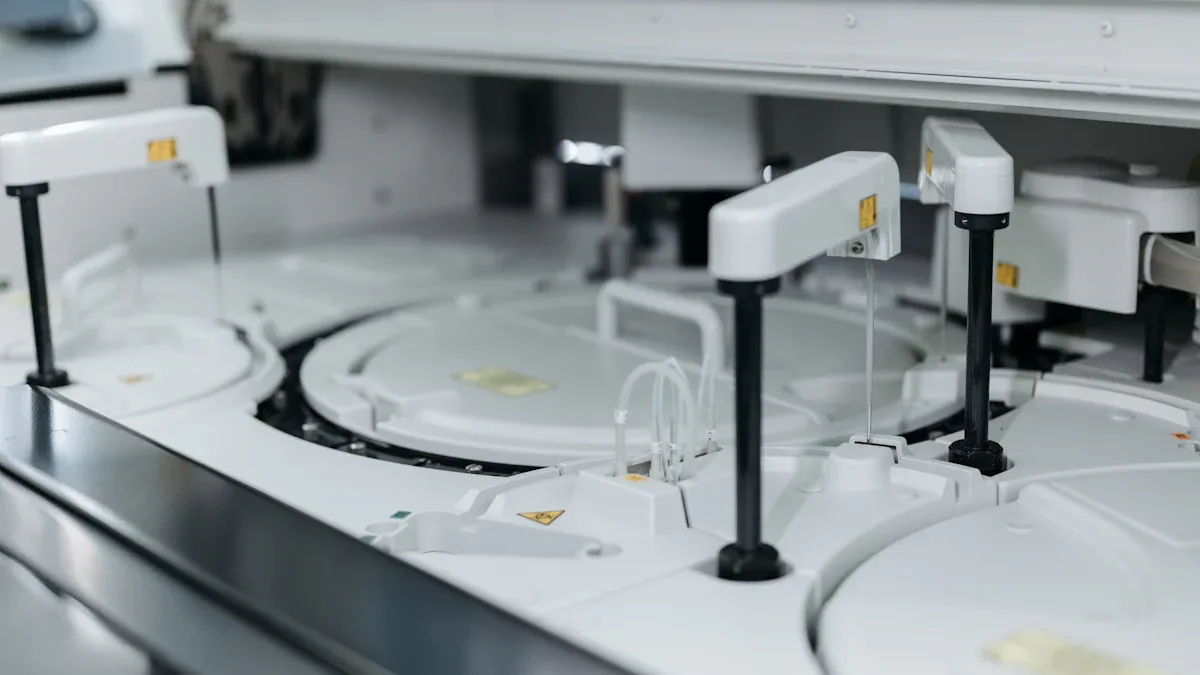The Role of Nitinol Tubing in Advancing Medical Technology

Nitinol tubing has transformed the medical device industry with its exceptional characteristics. Its shape memory properties allow devices to return to their original form after deformation, ensuring consistent performance. Nitinol’s superelasticity enhances flexibility, enabling devices to adapt to complex anatomical structures without compromising durability. Additionally, its biocompatibility minimizes the risk of adverse reactions, making it ideal for implants and other medical applications. These features position nitinol as a critical material in modern healthcare, driving innovation and improving patient care.
Key Takeaways
Nitinol tubing can remember its shape. It goes back to its original form after being bent, making devices work well.
Nitinol is super flexible. It bends easily to fit body shapes but stays strong.
Nitinol is safe for the body. It rarely causes bad reactions, so it’s good for implants.
Nitinol tubing helps with small surgeries. This means faster healing and better results for patients.
Unique Properties of Nitinol Tubing

Shape Memory and Its Impact
Enhancing device functionality
Nitinol's shape memory properties allow it to return to its original form after deformation. This unique characteristic enhances the functionality of medical devices by ensuring consistent performance during use. For example, nitinol tubing undergoes a diffusionless phase transformation in response to stress or temperature changes. This transformation enables devices to maintain their structural integrity, even under demanding conditions. Studies have shown that nitinol's high-cycle fatigue life is critical for Class 3 medical devices, such as transcatheter aortic valve replacement (TAVR) systems, where long-term reliability is essential.
Applications in minimally invasive procedures
The shape memory properties of nitinol tubing make it ideal for minimally invasive procedures. Devices like guidewires and stents can be crimped into compact forms for insertion and then deployed to their functional shapes within the body. This capability reduces procedural risks and shortens recovery times for patients. Nitinol guidewires, for instance, improve precision and efficiency during interventions, enhancing overall performance in medical device manufacturing.
Superelasticity in Medical Devices
Benefits for device flexibility and durability
Nitinol's superelasticity allows it to withstand repeated bending and twisting without permanent deformation. This property ensures that devices remain flexible and durable, even in complex anatomical environments. Compared to traditional materials, nitinol offers a fatigue life that is two to three times greater when processed using advanced manufacturing techniques. This advantage makes it a preferred choice for surgical instruments and implants.
Comparison with traditional materials
Traditional materials, such as stainless steel, lack the superelasticity of nitinol. Research highlights that nitinol's ability to endure high stress and strain cycles significantly improves the reliability of medical devices. For example, the probability distribution of superelastic material parameters enhances the understanding of fatigue safety factors, ensuring better performance in critical applications like cardiovascular implants.
Biocompatibility and Safety
Importance in medical implants
Biocompatibility is a crucial factor in medical implants, and nitinol excels in this area. Its compatibility with human tissue minimizes the risk of adverse reactions, making it a safe choice for long-term use. Additionally, nitinol's corrosion resistance ensures the structural integrity of implants over time, contributing to better patient outcomes.
How Nitinol ensures patient safety
Peer-reviewed studies confirm nitinol's biocompatibility and safety. For instance, research published in the Journal of Biomedical Materials Research demonstrates that nitinol exhibits minimal cytotoxicity and excellent corrosion behavior in human cell cultures. These properties ensure that nitinol-based devices, such as stents and orthopedic implants, provide reliable and safe solutions for patients.
Applications of Nitinol Tubing in Medical Device Manufacturing

Stents and Cardiovascular Devices
Improved performance and patient outcomes
Nitinol tubing has revolutionized the design and functionality of stents, particularly in cardiovascular applications. Its shape memory properties and superelasticity allow stents to be compressed for insertion and then expand to their intended shape within blood vessels. This adaptability ensures optimal blood flow and reduces the risk of restenosis. Advanced stent technology, leveraging nitinol's unique characteristics, has significantly improved patient outcomes by minimizing complications and enhancing long-term implant performance. According to the Nitinol Shape Memory Alloy market report, stents represent a major application segment for nitinol tubing, underscoring its critical role in medical device manufacturing.
Role in treating cardiovascular conditions
Nitinol-based stents are indispensable in treating cardiovascular conditions such as coronary artery disease and peripheral artery disease. Their flexibility and durability enable them to withstand the dynamic environment of blood vessels, ensuring reliable performance over time. Clinical studies comparing different manufacturing techniques for nitinol tubing highlight its superior fatigue life, which is essential for long-term implant performance in cardiovascular applications. These advancements have made nitinol tubing a cornerstone in the development of life-saving cardiovascular devices.
Guidewires and Catheters
Enhanced precision and flexibility
Guidewires and catheters constructed from nitinol tubing benefit from its superelastic properties, which enhance precision and flexibility. These devices can navigate complex anatomical pathways without losing their structural integrity. Nitinol's thermal memory further improves the performance of catheter systems, making them ideal for minimally invasive procedures. The material's biocompatibility ensures patient safety, while its flexibility allows for smoother navigation during delicate interventions.
Benefits in minimally invasive surgeries
Nitinol tubing has become a preferred material for guidewires and catheters used in minimally invasive surgeries. Its ability to endure repeated bending and twisting without permanent deformation ensures consistent performance during procedures. The growing demand for minimally invasive surgeries has driven the adoption of nitinol tubing in medical device manufacturing, as highlighted in market reports. This trend reflects the material's unmatched capabilities in enhancing surgical precision and patient outcomes.
Surgical Instruments and Tools
Increased reliability and precision
Surgical instruments made from nitinol tubing offer unparalleled reliability and precision. The material's superelastic properties allow instruments to maintain their shape and functionality even under high stress. This ensures that surgeons can perform complex procedures with greater accuracy. Studies on nitinol's fatigue life demonstrate its ability to endure repeated use, making it an ideal choice for surgical tools that require long-term durability.
Examples of Nitinol-based instruments
Nitinol tubing is widely used in the production of surgical instruments such as graspers, forceps, and scissors. These tools leverage nitinol's unique properties to provide enhanced performance during procedures. For instance, nitinol-based graspers can adapt to varying tissue densities, offering surgeons better control and reducing the risk of tissue damage. The material's biocompatibility and corrosion resistance further contribute to its reliability in surgical applications.
How Nitinol Tubing Advances Medical Technology
Enabling Minimally Invasive Procedures
Benefits for patients and healthcare providers
Nitinol tubing has become a cornerstone in advancing minimally invasive procedures. Its flexible superelasticity allows medical devices to navigate complex anatomical pathways with ease, reducing trauma to surrounding tissues. This adaptability benefits both patients and healthcare providers. Patients experience shorter recovery times and fewer complications, while healthcare providers achieve greater precision and efficiency during interventions. For instance, nitinol guidewires and catheters enhance procedural accuracy, improving clinical outcomes and reducing procedural risks.
Examples of advanced procedures
Minimally invasive procedures, such as endovascular surgeries and transcatheter interventions, rely heavily on nitinol-based devices. Stents made from nitinol tubing can be compressed for insertion and then expand to their functional shape within the body, ensuring optimal blood flow. Similarly, nitinol guidewires enable precise navigation through blood vessels, making them indispensable in treating cardiovascular conditions. These advanced procedures highlight the transformative role of nitinol in modern medicine.
Improving Patient Outcomes
Reduced recovery times and complications
The integration of nitinol tubing in medical devices has significantly improved patient outcomes. Its shape memory and biocompatibility ensure that devices perform reliably, minimizing the risk of complications. For example, nitinol stents reduce restenosis rates, leading to better long-term results. Additionally, the material's ability to adapt to the body's movements reduces trauma, contributing to faster recovery times.
Enhanced device performance and longevity
Nitinol's unique properties, including its flexibility and durability, enhance the performance and longevity of medical devices. Surgical instruments made from nitinol maintain their shape and functionality even under repeated use, ensuring consistent results. This reliability is particularly crucial for implants and other long-term medical solutions, where device failure could have serious consequences.
Supporting Innovation in Medical Device Design
Flexibility for complex and custom designs
Nitinol's shape memory properties and superelasticity provide unmatched flexibility for designing complex and custom medical devices. Manufacturers can create intricate structures, such as braided stents or coiled guidewires, that meet specific clinical needs. This versatility supports the development of next-generation medical devices tailored to individual patients.
Role in next-generation medical devices
The demand for advanced medical technology continues to grow, and nitinol tubing plays a pivotal role in meeting this need. Its unique combination of shape memory and biocompatibility enables the creation of innovative devices that improve surgical precision and patient care. From robotic-assisted surgeries to wearable medical devices, nitinol is driving the future of healthcare innovation.
Table: Advancements in Medical Technology with Nitinol Tubing
Application
Impact on Patient Care
Benefits
Nitinol Guidewires
Enable minimally invasive interventions with greater precision and efficiency
Reduces procedural risks and complications, shorter recovery times, improved clinical outcomes
Surgical Instruments
Significantly improve surgical precision and outcomes
Maintains shape and functionality, enhances patient safety and recovery
Medical Devices
Offer enhanced maneuverability and control during surgeries
Reduces trauma, shorter recovery times, improved overall surgical experiences
Nitinol tubing, such as that offered by AccuPath, exemplifies the potential of advanced materials in revolutionizing medical technology. Its applications in stents, surgical tools, and other devices continue to set new standards in healthcare.
The Future of Nitinol Tubing in Healthcare
Emerging Applications in Medicine
Potential in robotics and wearable devices
Nitinol is paving the way for groundbreaking advancements in robotics and wearable medical devices. Its shape memory and superelasticity allow for the creation of flexible, adaptive components that enhance device functionality. In robotics, nitinol tubing is being explored for use in surgical robots, where its ability to bend and return to its original shape improves precision during complex procedures. Similarly, wearable devices benefit from nitinol's biocompatibility and durability, ensuring patient comfort and long-term reliability. These innovations are transforming how healthcare providers monitor and treat patients, offering more personalized and efficient solutions.
Expanding use in regenerative medicine
The unique properties of nitinol are also finding applications in regenerative medicine. Its biocompatibility makes it an ideal material for scaffolds used in tissue engineering. These scaffolds provide structural support for cell growth, aiding in the repair of damaged tissues. Additionally, nitinol implants are being developed to deliver controlled mechanical stimuli, promoting faster healing and regeneration. As research progresses, nitinol tubing is expected to play a critical role in advancing regenerative therapies, addressing unmet medical needs, and improving patient outcomes.
Advancements in Nitinol Manufacturing
Innovations in precision and customization
Recent advancements in nitinol manufacturing have focused on improving precision and customization. Techniques such as laser cutting and additive manufacturing enable the production of intricate designs tailored to specific medical applications. These innovations allow manufacturers like AccuPath to create nitinol tubing with unparalleled accuracy, meeting the stringent requirements of the medical device industry. Customization ensures that devices perform optimally in diverse clinical scenarios, enhancing their flexibility and durability.
Sustainability and cost-effectiveness
Sustainability and cost-effectiveness are becoming priorities in nitinol production. Manufacturers are adopting eco-friendly practices, such as recycling nitinol scrap and reducing energy consumption during processing. These efforts not only minimize environmental impact but also lower production costs, making nitinol-based devices more accessible. The growing demand for minimally invasive procedures and advanced implants further underscores the need for sustainable manufacturing solutions.
Role in Personalized Medicine
Customizable devices for individual needs
Nitinol's adaptability makes it a cornerstone of personalized medicine. Its shape memory properties allow for the creation of devices that conform to individual anatomical structures, ensuring a perfect fit. For example, nitinol stents can be customized to match the unique dimensions of a patient's blood vessels, improving long-term implant performance. This level of customization enhances patient comfort and treatment efficacy, setting new standards in medical care.
Integration with advanced diagnostic tools
The integration of nitinol-based devices with advanced diagnostic tools is revolutionizing healthcare. Devices such as nitinol guidewires and catheters are being paired with imaging technologies to provide real-time feedback during procedures. This synergy improves procedural accuracy and reduces risks, leading to better patient outcomes. As diagnostic tools become more sophisticated, nitinol tubing will continue to support the development of innovative solutions that address complex medical challenges.
Note: The nitinol tube market is projected to grow significantly due to its unique properties and the rising demand for minimally invasive procedures. This trend highlights the material's critical role in shaping the future of healthcare technology. AccuPath's nitinol tubing exemplifies these advancements, offering precision-engineered solutions that drive innovation in the medical device industry.
Nitinol tubing has become a cornerstone of medical device manufacturing due to its exceptional properties, including shape memory, superelasticity, and biocompatibility. These characteristics have enabled groundbreaking advancements in stents, guidewires, catheters, and surgical instruments, transforming patient care and device performance.
Key Insights on Nitinol Tubing
Key Findings
Description
Fatigue Life
Nitinol's high-cycle fatigue life ensures reliability in demanding cardiovascular applications.
Manufacturing Impact
Advanced techniques enhance the durability and efficacy of Nitinol components.
Structural Integrity
Long-term integrity supports devices for younger patients with higher activity levels.
As medical technology evolves, Nitinol tubing will continue to drive innovation. Companies like AccuPath lead the way by offering precision-engineered solutions that meet the growing demand for advanced, reliable medical devices. This material's potential to improve healthcare outcomes remains unmatched.
FAQ
What makes Nitinol tubing unique in medical applications?
Nitinol tubing offers shape memory, superelasticity, and biocompatibility. These properties enable medical devices to adapt to complex anatomical structures while maintaining durability and safety. AccuPath’s precision-engineered Nitinol tubing ensures consistent performance, making it indispensable in advanced healthcare solutions.
How does Nitinol tubing improve patient outcomes?
Nitinol tubing reduces recovery times and complications by enabling minimally invasive procedures. Its flexibility and durability enhance device performance, ensuring reliable results. AccuPath’s Nitinol tubing supports innovative designs that prioritize patient safety and comfort.
Why is Nitinol tubing preferred over traditional materials?
Nitinol surpasses traditional materials like stainless steel due to its superior fatigue resistance and flexibility. It withstands repeated stress without deformation, ensuring long-term reliability. AccuPath’s advanced manufacturing techniques further optimize Nitinol tubing for critical medical applications.
What role does AccuPath play in advancing Nitinol tubing technology?
AccuPath specializes in precision-engineered Nitinol tubing tailored for medical devices. Their expertise in customization and advanced manufacturing ensures high-quality solutions that meet stringent industry standards. AccuPath drives innovation in healthcare with sustainable and cost-effective Nitinol products.
Can Nitinol tubing support personalized medicine?
Yes, Nitinol tubing’s adaptability allows for customized medical devices tailored to individual needs. AccuPath’s Nitinol solutions enable the creation of patient-specific implants and tools, enhancing treatment efficacy and comfort in personalized healthcare.

